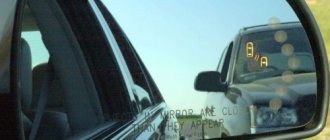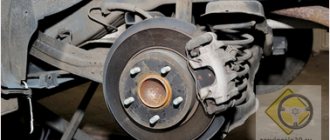Driving in someone else's car and transferring the car to another person can result in serious violations and hefty fines.
Often, car owners, when entrusting their car to another person, do not think about the consequences. As well as drivers who rented vehicles for temporary use. In most cases, the transfer of a car goes unnoticed by law enforcement agencies. If the inspector stops a car that was transferred to another person by the owner incorrectly, then the punishment will be very severe. We’ll talk further about the legal consequences of driving someone else’s car.
How to drive someone else's car correctly?
There are two main concepts:
The owner is the person indicated in the vehicle documents (PTS and SRTS). He has the right to dispose of the car, sell it, give it as a gift and perform other manipulations. The owner, in fact, is a renter who uses the car for a fee or free of charge.
The owner does not have a license to the car. He can only use the car within the agreed period and is obliged to return the vehicle intact and in its original condition. To drive someone else's car, the owner must have four documents:
- OSAGO policy. Insurance must be unlimited. If it is limited, then the driver who will temporarily use the car must enter.
- Driver's license. The owner, by transferring management rights to a person who does not have rights, risks falling under administrative liability. All details about deprivation of rights are collected in this article.
- SRTS. A certificate of registration of ownership is given to the user along with insurance.
- Power of attorney. Inspectors do not have the right to check its presence, but its presence will save you from many problems.
If the insurance is unlimited, then the power of attorney will help prove that the car was not stolen. Just imagine what will happen if, in a conflict situation, the owner reports the theft to the police? And it will be very difficult to prove your innocence.
Lawyer Anisimov Representation and defense in court
However, within the meaning of the Code of the Russian Federation, it seems possible to conclude that the driver is also the person directly driving the vehicle, regardless of the presence, absence or deprivation of his right to drive.
We recommend reading: If you previously registered for government services and were unable to come but paid the state fee
According to the Rules for passing qualifying exams and issuing driver's licenses, approved by the Decree of the Government of the Russian Federation of June 8, 1997. No. 831, citizens are issued national and international driver's licenses.
What does the owner need to know?
When entrusting your car to a stranger, do not be lazy to draw up a power of attorney in writing. It indicates the details of the owner and temporary owner and the validity date of the power of attorney (you can write that the right of use is valid indefinitely). There is no need to have the document certified by a notary.
In fact, since 2012, the obligation to draw up a power of attorney has disappeared. And now they practically don’t use it. Inspectors do not have the right to demand a power of attorney, and the driver can refuse to provide it without consequences. However, the owner needs the document to avoid many problems:
- In the event of an accident, charges will be brought against the owner of the vehicle if the driver flees the scene of the accident.
- If the driver is drunk, the owner may be accused of transferring control of the vehicle to a person who is intoxicated.
- For violations recorded by the camera, fines are sent to the owner (chain letters).
In all of the above cases, a power of attorney will help prove that at the time of the violation it was not the owner, but another person who was driving. If the driver is intoxicated, it is necessary to prove that the car was handed over to a sober person.
Possible fine
There is no fine for driving someone else's car if the driver has all the necessary documents with him. The absence of at least one of them is considered a violation for which you will have to be punished:
If the driver is not included in the MTPL, then he will have to pay 500 rubles, according to Part 1 of Article 12.37 of the Administrative Code.
If the driver does not have a license. The fine for the driver himself will be up to 15,000 rubles, according to Part 1 of Article 12.7 of the Administrative Code. The owner will also have to pay for transferring the right to drive a vehicle that does not have a license. And the punishment for this is 30,000 rubles, according to Part 3 of Article 12.7 of the Administrative Code.
If there is no STS, the fine will be 500 rubles under Part 1 of Article 12.3 of the Administrative Code.
More serious punishment is provided in cases where a driver drives a car while drunk. The user of the car faces a fine of 30,000 rubles and deprivation of his license for up to 2 years, under Part 1 of Article 12.8 of the Administrative Code. A similar penalty is provided for the owner who handed over the car to a drunken person, in accordance with Part 2 of Article 12.8.
What should we not forget when transferring a car to a temporary owner?
First, a little theory. There are two basic concepts: owner and owner.
The owner is the person indicated in the documents for the car. He has the right to dispose of it, sell it, donate it and perform other actions. The owner is nothing more than a renter who uses the car for a fee or free of charge.
It is important to remember: the owner does not have a license to the car. He can only use the car within the agreed period and is obliged to return it safe and sound.
To drive someone else's car, the owner must have four documents
The first is an MTPL policy. Insurance must be unlimited. If it is limited, then the driver who will temporarily use the car must fit into it.
Second. Driver's license. The owner, by transferring management rights to a person who does not have rights, risks falling under administrative liability. It certainly won't seem too small here.
Third. STS. Certificate of registration of ownership. This document is given to the user along with the insurance.
Fourth. Power of attorney. Inspectors do not have the right to check its presence, but it is worth refusing it - it will save you from many problems.
For example, if the insurance is unlimited, then a power of attorney will help prove that the car was not stolen. Imagine that a conflict arose between you and the owner, and he decided to punish you by reporting the car to the police as stolen. Without a power of attorney, it will be very difficult to prove your innocence, so this paper is needed not only by the owner, but also by you.
What documents should you take with you for a car in 2020?
The car registration certificate must contain all the data on the car. This document looks like a laminated card that contains the car number, engine number, and owner information. This document confirms that the car belongs to you.
The other day, one of my friends was stopped by traffic cops. He looked like he had been working only recently. Word by word, it came to document verification. My friend's driver's license and insurance were fine. Suddenly the traffic cop asked him for his PTS.
In what cases will the owner have to answer?
We agreed that friendship is friendship, but business is business. When entrusting a car to a stranger, do not be lazy to draw up a power of attorney in writing. But what about someone else, even your own, because if something goes wrong, you too will have to answer.
In the power of attorney, indicate the details of the owner and temporary owner and the validity date of the document, or write that the right of use is valid indefinitely. There is no need to go to a notary.
Since 2012, the obligation to draw up a power of attorney has disappeared. However, in this case, the document is necessary for the owner to avoid many problems.
For example, the temporary owner got into an accident, but got scared and ran away. Well, then expect to be blamed for the accident. If the driver is drunk, the owner may be accused of transferring control of the vehicle to a person who is intoxicated. For violations recorded by the camera, chain letters are also sent to the owner.
Don't want any trouble? Write a power of attorney. It will help prove that at the time of the violation it was not the owner, but another person who was driving.
What documents are needed to drive someone else's car in Russia?
Since November 24, 2012, to drive someone else’s vehicle, you need an insurance policy (in which this driver is registered) and the so-called “yolk” - a vehicle registration certificate. You no longer need to issue a power of attorney. Of course, don't forget your rights!
In fact, today it is enough to simply enter the data of this person into the MTPL policy, in the column about persons allowed to drive this car. But, if such a trip is a one-time trip and was not foreseen in advance, then, of course, it is no longer possible to change the policy details, unless you get a new one. Therefore, you can issue an ordinary power of attorney with certification from a notary.
What fines are there for driving someone else's car incorrectly?
Driving someone else's car is not a crime and is not punished in any way if the new owner does not violate anything, and the owner has handed over all the documents to him. The absence of at least one of them is considered a violation for which you will have to answer.
So, if the driver is not included in the MTPL, then he will have to pay 500 rubles, according to Part 1 of Article 12.37 of the Administrative Code.
If the driver does not have a license, then the fine for him will be up to 15,000 rubles (Part 1 of Article 12.7 of the Administrative Code). The owner will also have to pay for the transfer of management rights to a citizen without rights. And this is 30,000 rubles (Part 3 of Article 12.7 of the Administrative Code).
What documents are needed to drive someone else's car in Russia?
The Government of the Russian Federation issued Resolution No. 1156 dated November 12, 2012 (hereinafter referred to as the Resolution), which amended the traffic rules. It came into force on November 24, 2012. From this date, driving someone else’s car no longer requires a power of attorney issued by the owner of the vehicle. In addition, the period during which it is necessary to register a car with the traffic police has increased.
Hello! Tell me please. I have a car (my grandfather’s) with insurance (for him). Now I want to drive it, I know that there are 2 options for obtaining insurance (+ for me or open). What about the power of attorney? Is it necessary (it seems to have been cancelled)? and does it need to be certified by a notary? and what documents in my case are generally needed to drive a car? Thank you!
What do you need to provide to a traffic police officer?
Recently, the list of documents that a driver must have with him has been significantly reduced. To avoid any controversial situations that would allow traffic police officers to impose any punishment, the car owner must always carry with him and present the papers specified in clause 2.1.1 of the traffic rules. What kind of documents are these? The list is limited to the 3 most important:
- OSAGO policy;
- driver's license;
- registration certificate.
Driver's license
You can confirm your right to drive a vehicle only with a driver’s license, and they must meet certain requirements:
- The information in them is not distorted and is not out of date. For example, the last name has changed, but the car owner is in no hurry to change his license.
- They are not expired. Let us remind you that at the moment there is a rule about changing licenses after 10 years from the date of issue. Driving with an expired license is equivalent to driving without one.
- The certificate is intact and not damaged.
- A category is open for the type of transport driven by the driver.
It is important to remember that the Code of Administrative Offenses of the Russian Federation provides for an administrative fine for driving a vehicle without a driver’s license, in particular in Articles 12.3 and 12.7
Vehicle registration certificate
The set of documents that the driver must have with him every trip also includes STS. If you do not present this laminated paper at the time of the stop, the inspector may conclude that the person is traveling in an unregistered vehicle. This will entail not only the imposition of a fine for the lack of a certificate, but the car itself can be detained until the circumstances are clarified.
If you just bought a car and you are driving it home, then it is likely that you will actually be stopped at the traffic police post, because there are no license plates on vehicles. Ten days are allotted for registration, and, therefore, for obtaining a certificate. During this period, employees must present the vehicle title, as well as the purchase and sale agreement.
If the car was purchased on the secondary market, the STS must be transferred immediately along with the car.
Insurance policy
The obligation to insure your movable property is enshrined in law, so you always need to take out OSAGO to drive a car. But there are also requirements here. The policy must be:
- current at the time of inspection, that is, not expired;
- strictly government-issued paper with appropriate marks;
- unlimited or the driver’s full name must be included in it.
At the moment, there is a practice of registering compulsory motor liability insurance via the Internet, so the second paragraph does not apply for such cases. This is because the authentic policy comes by mail, and it can be printed on plain paper.
Other documents
The vehicle documentation listed above is the main one. It turns out that if we drive a regular passenger car, we will be required to have exactly this package of papers. However, there are other documents that certain categories of citizens are required to carry with them in one case or another. They were also listed in paragraph 2.1.1. Traffic rules These include, for example:
- If a vehicle is marked “Disabled,” employees have the right to request documentation that can confirm the fact of disability.
- When transporting people, you must provide paper permitting such activities, a license card.
- When transporting any cargo (including dangerous goods), you must have documents for it with you. You also need to have a waybill.
Personal documents
Whatever type of transport you travel by, the first thing you need to do is apply for a visa. You submit documents with the expectation that the processing will take from a month to two.
You must have personal documents with you on your trip:
- international passport;
- Russian passport;
- birth certificate for children under 14 years of age;
- visa to countries where it is required;
- medical insurance.
Medical insurance must cover the cost of services in the amount of at least 30 thousand euros for the entire period of stay in the country.
Availability of insurance and other personal documents is mandatory for everyone in the car.
Return to contents
What to take when crossing the border
Documents for any driver who wants to cross the border in his car must be up to date within the next month. Otherwise, customs simply will not let you cross the border.
Before the trip, you should prepare the following package of papers:
- insurance policy in the “green card” format, valid in any state;
- driver license;
- STS;
- checks or invoices for goods transported across the border;
- PTS (if the car has just been purchased, then it is also supplemented with a purchase and sale agreement);
- waybills in cases where the driver is transporting cargo.
When and who should register the car?
Registration of motor vehicles is caused by the need to control the turnover and transactions with this source of increased danger, calculate transport tax, and promptly identify violators of traffic rules using the traffic police database.
The car must be registered:
- upon its first acquisition by citizens or organizations on the territory of the Russian Federation;
- in subsequent transactions with the transfer of ownership;
- when importing an imported car across the border, proper customs clearance with payment of import duties;
- when receiving a car by inheritance;
- when changes are made to the design of the car (in this case, changes will be made to the credentials).
Only vehicles that meet the requirements of the technical regulations CU 018/2011 can be registered and registered. This regulatory act specifies the safety parameters of the entire vehicle and its individual units. The supporting document for new cars according to TR CU 018/2011 will be approval of the vehicle type.
The responsibility for registration rests with the owner of the car. This may be the buyer or the donee of the transaction, the heir. If the car is in temporary possession by power of attorney, there is no need to register it. However, when concluding a lease agreement, when the vehicle will be operated outside the region of registration, temporary registration may be carried out.
To register a car with the traffic police, you must comply with the rules and deadlines specified in Order of the Ministry of Internal Affairs No. 399:
- after purchasing a car, the new copyright holder must submit an application for registration within 10 days;
- if within 10 days the buyer or donee has not contacted the traffic police, the former owner can do so;
- when making transactions with a car, it is not necessary to change the license plate number (this issue can be decided by the seller and buyer in the contract);
- You can go through the registration procedure at any traffic police department in the country.
There is no need to contact the traffic police if the car is imported into Russia in transit for up to 3 days. Also, vehicles not intended for movement under public contracts are not registered.
What do you not need to take with you?
We have already indicated above what documents are needed to drive your car. If you just plan to travel by passenger vehicle, then only 3 basic papers are enough; requiring any other documentation is illegal. Sometimes employees take advantage of the driver’s ignorance and even issue fines.
However, it is not even necessary to carry other important papers with you, much less provide them for verification. The list described below can be kept at home:
- DCT, deed of gift or any other evidence of car ownership.
- PTS. In fact, a vehicle passport is required only for the sale and registration of a car.
- Diagnostic card, which confirms the passage of technical inspection.
If you are asked for any of these or other documents that you are not required to provide, tell the employee that his actions are illegal. Be sure to find out his name and title, and then call the department’s hotline and leave a complaint.
How to present documents?
At least once, every driver was stopped by traffic police officers. Not everyone likes communicating with representatives of the power structure, but certain rules must still be followed.
A few tips will help you avoid getting into unnecessary trouble:
- Stopping the car upon request is the main responsibility of the car owner. When you see an inspector's stop sign or an audio message, you should immediately pull to the side of the road.
- You can communicate with a traffic police representative both on the street and without leaving the car, by first opening the car window. In this case, the inspector himself is obliged not only to introduce himself, but also to report the reason for the stop. If this does not happen, then such a situation can already be regarded as a violation.
- Communication should be polite, do not allow insults, rude words, or shouting. If you have not violated anything and are sure of it, there is no need to create a scandal - present the documents, wait for the employee to review them, and you can continue on your way. The inspector should act similarly politely.
- It is impossible not to hand over documents to an employee, show them open, through glass, and so on. The certificate, OSAGO and STS must be given into the hands of the official.
- Be calm. Nervousness and sudden active movements can arouse suspicion, so the employee is able to decide to inspect the entire car, which will take much longer than a regular check.
If you are invited to go into the interior of a traffic police vehicle, this does not mean that you have violated anything. In addition, this is not a requirement, but solely the right of the driver, so you can refuse the offer, which will not entail any negative consequences.
Dear reader!
The article provides basic information, but most cases are individual in nature. In this connection, our website employs on-duty lawyers whom you can contact by phone:
- Moscow ext 104
- St. Petersburg ext 104
- All regions ext 289 (Toll free)
When you contact us, you will receive advice specifically on your problem.
applications for vehicle registration with the traffic police
Where to register a car
The basis for registration is the application of the copyright holder or his representative. You can fill out and submit the document in the following ways:
- directly to any traffic police department in the country (usually contact the department at the place of actual residence);
- through MFC institutions;
- through the State Services portal, if the owner has a personal account there.
When you contact the traffic police, you can immediately go through registration and registration within a few hours. When submitting an application through the MFC or the State Services portal, you can pre-select the time, date and traffic police department where the vehicle will be inspected and recorded.
Information about the working hours of the traffic police department can be found on the websites of this department. Without an appointment through the MFC or the State Services portal, you will have to wait in a live queue, so the procedure may take several hours.
State duty
The duty rates for vehicle registration are provided for in Article 33.33 of the Tax Code of the Russian Federation:
- if the procedure is accompanied by the issuance of new license plates – 2,000 rubles;
- if during registration and change of owner there is no need to change numbers - 500 rubles;
- if a new PTS is issued at the same time during registration - 800 rubles.
In 2020, you can get new license plates from the traffic police. However, from August 2020 this will change. The traffic police will only assign a number to the car, and you will have to order plates with signs from accredited organizations.
Presenting the vehicle for inspection
On the day and time specified in the application, or immediately upon contacting the traffic police, you need to bring the car for inspection. There is no need to undergo a diagnostic examination. In the presence of the applicant, the traffic police inspector will check the VIN identification code and vehicle unit numbers with the data in the title. Other characteristics (brand, color, etc.) will also be checked. If the check is successful, a decision is made to register the car.
Registration deadlines
According to Order of the Ministry of Internal Affairs No. 399, registration actions must be completed immediately upon the applicant’s application. The procedure includes checking documents and inspecting the car, which will take from half an hour to several hours. If the application was submitted directly to the traffic police, you will have to wait in a live queue. If the date and time were selected in advance through the MFC or the State Services portal, you will not have to wait in the live queue.
What will the applicant receive?
After completing the procedure, a registration card will be added to the vehicle, and the relevant information will be transferred to the traffic police database (register).
The applicant will receive:
- vehicle registration certificate;
- PTS with a record of the new owner, or a new vehicle passport;
- documents submitted along with the application.
The certificate will contain information about the car and its main characteristics, license plate numbers, and information about the owner. This form must be carried with you during the management process and shown during roadside checks at the request of traffic police inspectors.
Driving without documents for a car (STS, License, Insurance)











